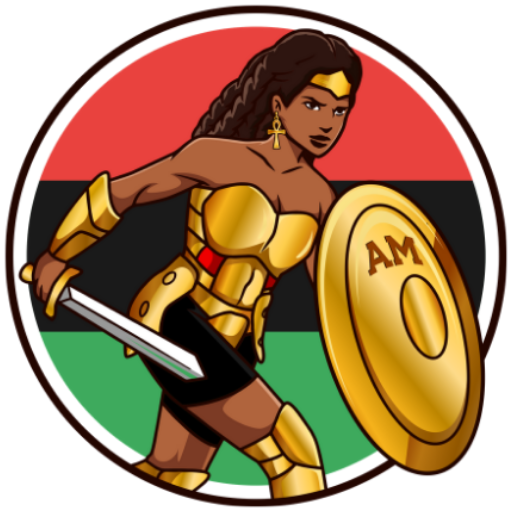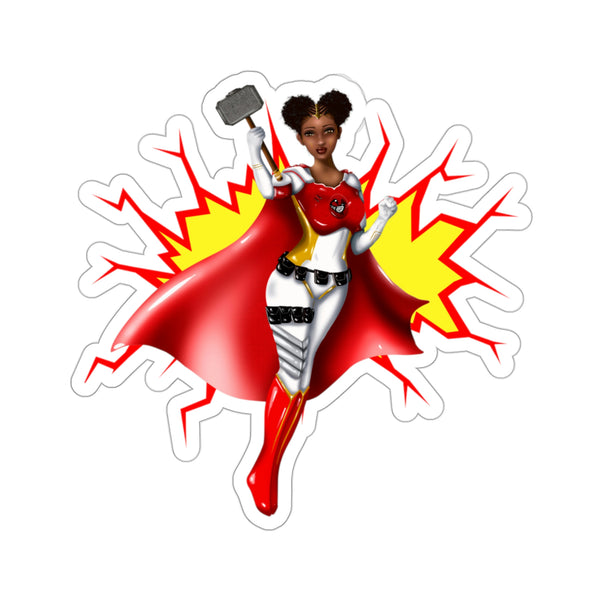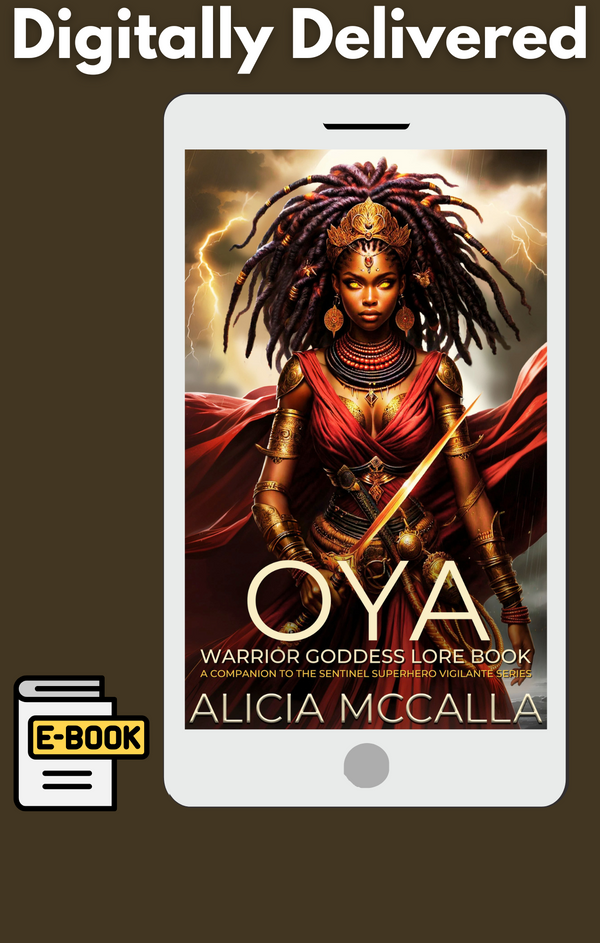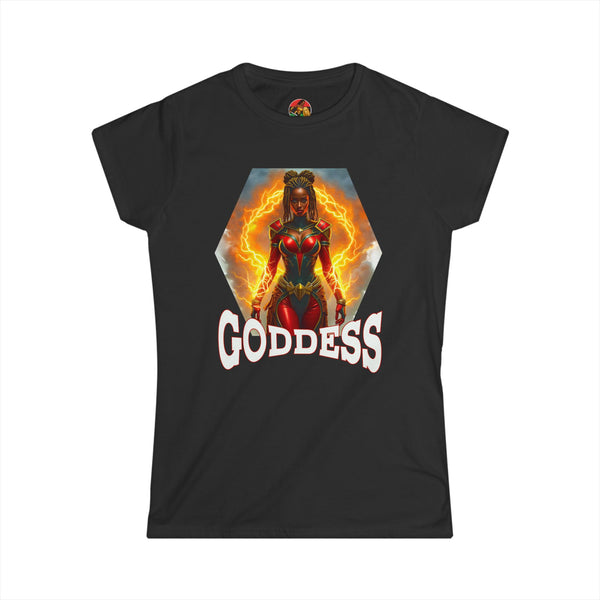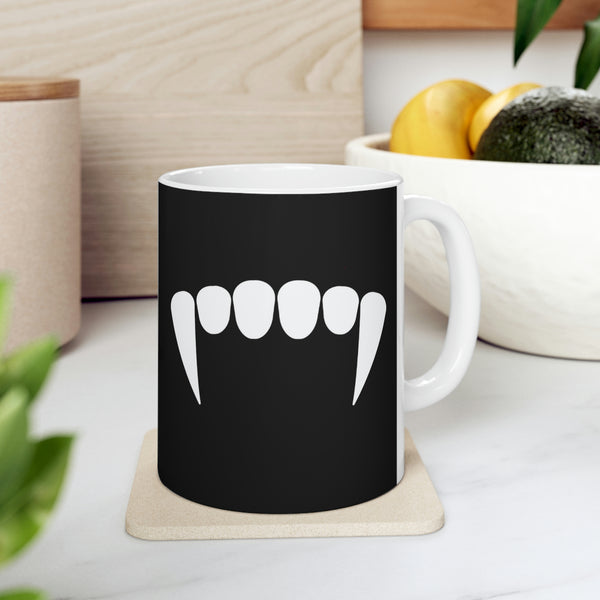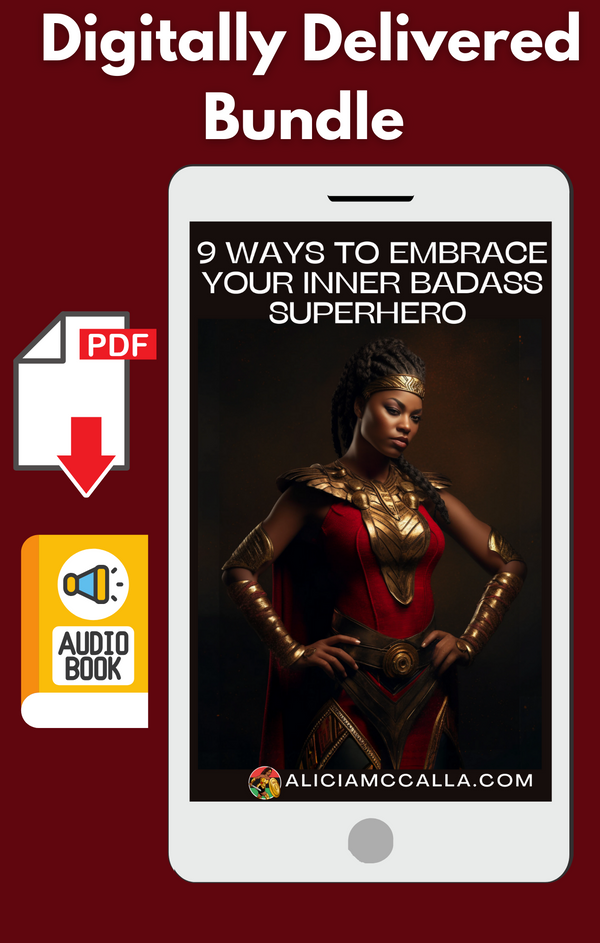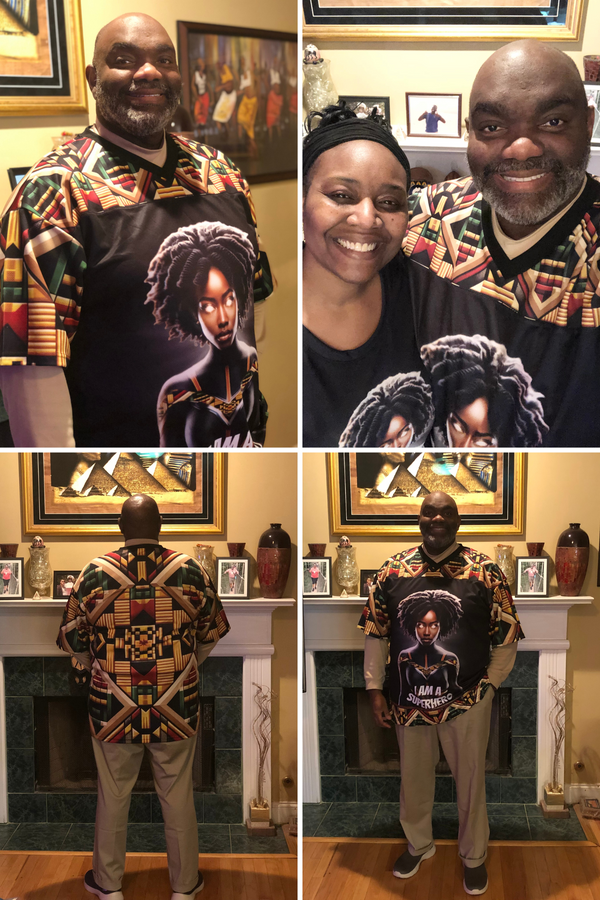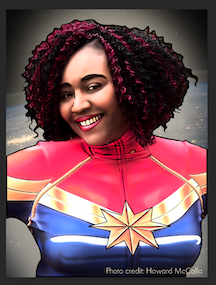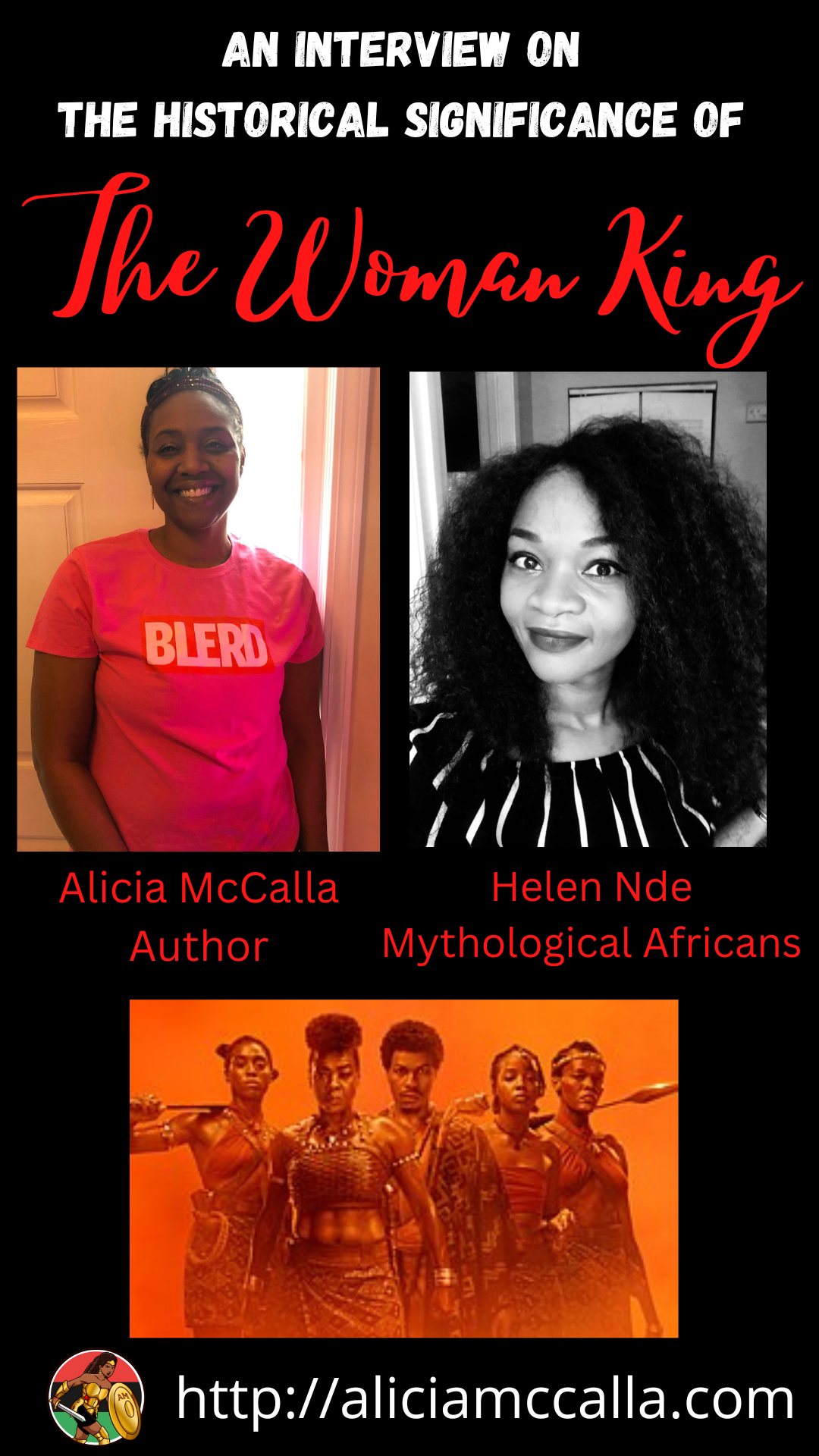
Author Alicia McCalla Interviews Helen Nde of Mythological Africans on the Historical Significance of the Woman King
Share
Alicia: I know Mythological Africans focuses more on folklore and mythology, can you explain why you have decided to give more context to the Woman King?
Helen: First of all, thank you so much for the opportunity to talk about Mythological Africans!
I decided to give more context to The Woman King because it is a historical epic which focuses on an important and highly controversial group of people in African history: the Agojie of Dahomey. Mythological Africans focuses on mythology and folklore, but history, folklore and mythology are connected. They are all the stories we tell ourselves about who we were, are, and could be. Before the concept of history as we know it emerged, mythology and folklore, so stories, songs, etc. were the main ways in which people recorded their history. In today’s world, all of us are recording history, with our social media posts. So, I’d like to leave something in the historical record about how we received this movie.
The idea came out of a conversation with Rafeeat Aliyu, the friend with whom I am hosting the space. Rafeeat is a writer, a documentary film maker and someone I consider very knowledgeable about African history and culture. She clued me in to the fact that the Agojie and the Ahosi were more complex and multidimensional than they are often portrayed. I felt that was something worth exploring.
Alicia: Can you give us a short background of the history behind this movie?
Helen: The movie, from what I understand, is a fictional account of events in the Kingdom of Dahomey. Dahomey was a West African Kingdom which existed from the 1600s to the early 1900s when it was conquered and colonized by the French. It is now the Republic of Benin. Dahomey grew its wealth and power through conquest of its neighbours for land, resources, and labor. The Kingdom also traded with Europeans which, unfortunately included the Transatlantic Slave Trade. Dahomey was also known for its fierce and formidable all-women warrior units, who were a part of the Kingdom’s offense and defense. The movie is set at a time when the Kingdom was still involved in the slave trade. It tells the story of Nansica, a leader of the Agojie. It also tells the stories of some of the young women under her command. That’s as much as I will say so I don’t spoil it for other people!
Alicia: Why is it important to highlight these female warriors?
Helen: Historical accounts tend to ignore the accomplishments of women or underemphasize the role they played in shaping important events, for better or worse. Quite often, when women are highlighted, their portrayal is not flattering. On that account alone, I think it is important to highlight the role that girls and women played in making the Kingdom of Dahomey the powerhouse that it was, especially at a time when the status of women was rapidly declining across the continent. As I’ve said before, I believe we can honor ancestors and historical figures while allowing them multidimensionality and the humanity of their mistakes. Underneath the monstrosity of slave raiding and trading was a highly sophisticated state whose workings were heavily influenced by women. The Fon, who are the people who composed the majority of the Dahomean population, believed in a Mother-Son pair of Creator Beings called Mawu and Lisa. This meant most positions of influence in all social, religious, economic, and political units, from the family to the monarchy, had women and men in complementary roles. Women were involved in all aspects of political, religious, economic, and social life in Dahomey. That is noteworthy.
Alicia: Historically, how did the female warriors show bravery, courage, or strength?
Helen: The Agojie were a subset of the Ahosi, the Wives of the King. Ahosi were women and sometimes men of the Dahomean palace. Many of them were captives from wars and people given to the King to garner his favor, that is, they did not become Ahosi by choice. There is evidence that some Dahomeans did not want to be given to the palace. Some accounts say girls committed suicide by jumping into wells when they realized they were to be sent to the palace. I imagine that joining the fellowship of the Agojie, who were often recruited from among war captives, gave many of these otherwise disenfranchised women a chance to be part of something bigger than themselves. That, in itself, is a study in bravery, courage, and strength. The direction in which their resilience was ultimately channeled is unfortunate, but we cannot deny the bravery, courage and strength required to take a terrible hand of cards dealt to you and make something out of it.
Alicia: There are some reasons why everyone doesn't appreciate these women or want to celebrate them. Can you explain why some might be hesitant to support?
Helen: The Kingdom of Dahomey enriched itself through conquest, slave raiding and trading. The Agojie played a major role in this. Dahomeans also believed that they could send messages to their ancestors through people who they sacrificed. Many war captives, people captured by the Agojie and other Dahomean warriors, were killed for this purpose. This fact will always be a blight on the legacy of the Agojie and the Kingdom of Dahomey. It should absolutely not be glossed over. That being said, empires, kingdoms and their warrior groups always exhibit similar characteristics: hierarchies, conquest, domination, murder and oppression of others. It is important to not make the Kingdom of Dahomey and the Agojie out to be a special case. They are the norm as far as these things are concerned.
Alicia: As an African American, I don't always understand the significance from an African perspective, what do you think African Americans should consider while watching this movie? What might we be missing?
Helen: It is important to remember that this is not a documentary. This is a fictionalized account which borrows from but is not true to history. Also, stories can tell us what was, what is, what might have been, or what could be. The Woman King does two of those things very, very well. The way I see it, by reimagining actual historical events, the movie offers an account of what might have been and provides a vision of what still could be. Black/African people are still being exploited by fellow Black/Africans and other people from all over the world. Slavery and human trafficking are still problems on the continent. We can take up the mantle and do differently than the Agojie and other people in the past did. That being said, as the descendants of people who were sold into slavery, African Americans are fully within their rights to dislike and boycott the movie.
Alicia: I do know the Dora Milaje were based on these characters, from an African Mythological viewpoint, might you have any thoughts on this?
Helen: In terms of their commitment to their King and their people, the Dora Milaje and Agojie have a lot in common. However, the Dora Milaje, in my opinion, are a more honorable and likable warrior unit. They are what the Agojie might have been, given different social and economic conditions. I think the gift that the Dora Milaje of Black Panther and Agojie of The Woman King give is the vision of a future in which we do things differently.
Alicia: Please tell my audience how they can find you and learn more about Mythological Africans.
Helen: Mythological Africans is @MythicAfricans on Twitter. We are hosting a Twitter Space discussion at 1:00pm ET this Sunday September 18th to talk some more about The Woman King. Everyone is invited!
Mythological Africans also has a YouTube Channel and recently we’ve been doing deep dives into the sexual practices of African peoples. Definitely go take a look! There’s also a Medium Blog , and a Newsletter. The MythologicalAfricans.com website is the one stop shop for all you need to know about the platform. From there you can listen to recordings of talks I have given, submit a research request and support the work.
Thank you again for the opportunity to talk about my work!
Thanks Helen! Great Interview.
